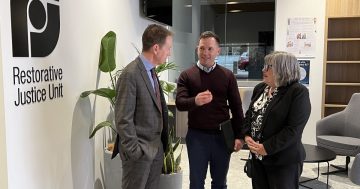
An ACT restorative justice program where offenders come face-to-face with their victims will be extended to include family violence and sexual offences from July next year.
The ACT Restorative Justice Unit is currently consulting with stakeholders over guidelines for the management of the “highly sensitive” next phase of the voluntary program involving sexual offences.
The unit has already completed and drafted guidelines for managing the domestic and family violence part of this phase of the program.
A spokesperson for the Justice and Community Safety (JACS) Directorate said that 128 adult offenders and 169 young offenders were referred to the restorative justice scheme in 2016-2017.
“Restorative Justice offers the people affected by an offence the opportunity to participate in their own justice process,” the spokesperson said.
“It brings together victims, offenders who are taking responsibility and their respective personal supporters in a carefully managed, safe environment.
“A Restorative Justice process is voluntary, fair, inclusive and respectful. It enhances the rights of victims of offences by empowering them to make decisions about how to repair the harm.
Shared humanity
“Restorative Justice is trauma-informed and encourages recognition of shared humanity. In this way it supports the safe inclusion of vulnerable participants.”
The Crimes (Restorative Justice) Act 2004 enables access to restorative justice at every stage of the criminal justice process without substituting for the criminal justice system or changing the normal process of criminal justice.
The Restorative Justice legislation also enables agencies that have a role in the criminal justice system to refer offences for restorative justice. The agencies include ACT Policing, Child and Youth Protection Services, the Director of Public Prosecution, the Courts, ACT Corrective Services, the Sentence Administration Board and the Victims of Crime Commissioner.
Huge benefits for victims and offenders
The JACS Directorate spokesperson said that the possibility of a non-adversarial justice approach like Restorative Justice “is often misconstrued as soft on offenders and dangerous for victims”.
“In reality, Restorative Justice provides huge benefits to victims of crime and their offenders,” the spokesperson said.
“Restorative Justice gives victims the opportunity to have a say about what happened to them, to get answers to their questions, and for their losses – both material and emotional – to be acknowledged.
“Restorative Justice gives offenders the opportunity to take responsibility, explain their actions, listen to the broader impact of their actions on others, and to actively contribute to making amends.
“Best practice evidence based research shows that Restorative Justice succeeds in lowering the symptoms of trauma, revenge ideation and anger in victims and leads to moderate reductions in recidivism, with best results for violence offences and adult offenders.”
The JACS Directorate spokesperson said that phase two of the restorative justice scheme began on 25 February 2016. It allowed for adult offenders and for serious offences by both adults and young people to be referred.
Phase three will begin in July 2018 and the spokesperson said that anyone who would like to provide comments as part of the consultation process for phase three can contact the ACT Restorative Justice Unit on 6207 3992.
Do you think restorative justice is a good idea? What about the move to expand the scheme to include sexual offences and domestic and family violence offences? Let us know your thoughts in the comments below.



















